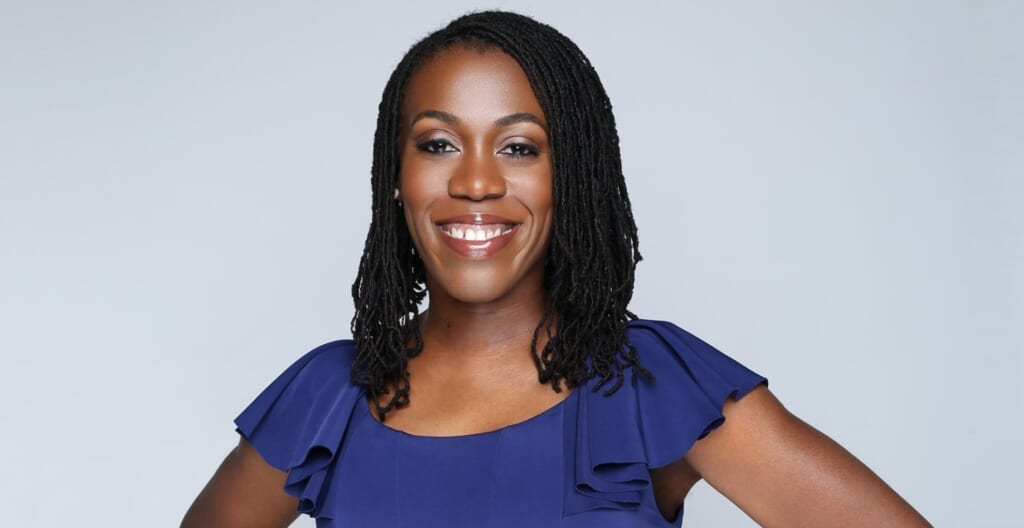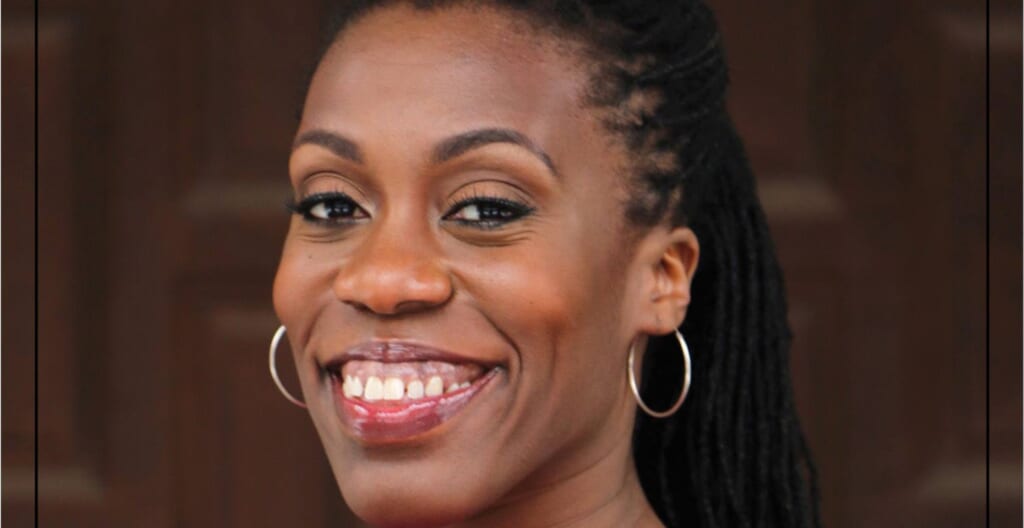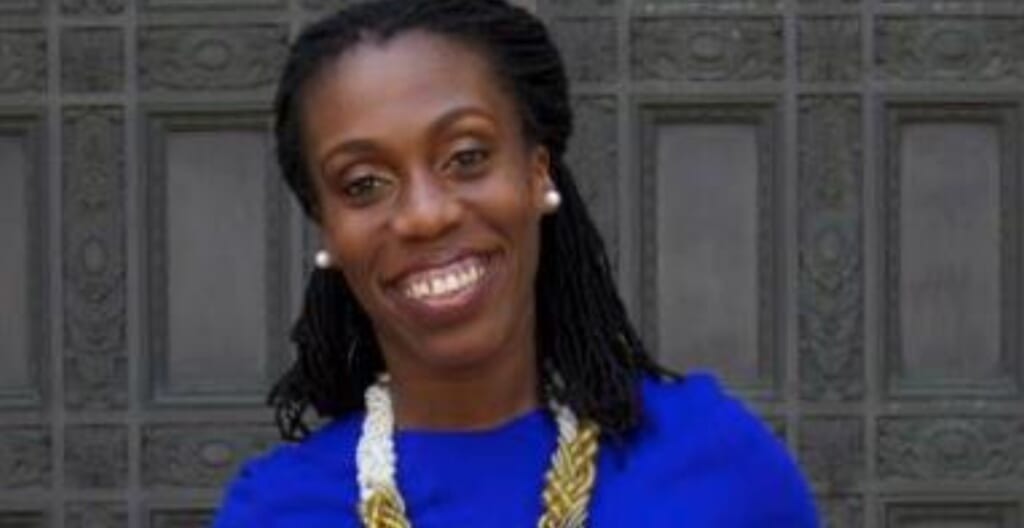Tiffany Aliche, known as “The Budgetnista,” through her experiences of overcoming financial hardships, has become synonymous with helping others on the journey of financial wellness. The award-winning financial educator and America’s favorite financial educator turned her experience into a platform that has transformed lives.
To her loyal online following, she refers to as “Dream Catchers” which created the Live Richer Academy that has helped more than one million women save more than $250 million collectively, pay off more than $200 million in debt and financially plan for a better life. In 2009, the Great Recession resulted in her losing her job as a teacher and going on unemployment.

The coronavirus pandemic severely impacting people financially inspired Aliche to shift her focus from writing workbooks on separate financial subjects to something more in-depth.
Read More: Jamie Foxx, Halle Berry and more partner on new documentary ‘Number One on the Call Sheet’
“People would have good credit knowing and no estate plan, great savings [but] no budget, a budget but no insurance,” Aliche told theGrio. “It was really last year when I started writing and I thought to myself, ‘Tiffany, there has to be a comprehensive guide that walks people from the beginning of their financial journey really to the end.’ And what does that look like?”
Released last month, the instant New York Times Bestseller book, “Get Good with Money: 10 Simple Steps to Becoming Financially Whole,” is an effort to help people becoming more financially secure in all aspects of their lives.
“I realized there were 10 core components and I call it financial wholeness because I wanted to see my Dream Catchers succeed holistically,” Aliche said. “Not just, ‘Oh, my credit score!’ ‘Oh, my savings!’ I wanted them to have all of the components of financial wholeness, not just one or two. So, it was seeing Dreamcatchers starting to struggle during quarantine and the pandemic, and watching people succeed but not holistically: financially.”

Aliche, in her partnership with Assemblywoman Angela V. McKnight, was instrumental in passing “The Budgetnista Law A1414” in New Jersey, making it mandatory to integrate financial education into middle school as well as high school, according to Forbes.
In recognition of National Financial Literacy Month, theGrio spoke to Aliche about her new book, developing healthy financial behaviors, basic budgeting, and more.
theGrio: From your perspective, what’s the difference between financial freedom vs. financial wholeness?
Aliche: Typically when people mention financial freedom what they’re saying is I don’t have to work anymore because I have enough that I can support myself without having to actually work to bring in money. That’s a great thing but the problem with financial freedom is that it’s only one part of the financial life you need to adhere to.
With financial wholeness, you can be financially free and not financially whole. I was. With financial wholeness, it’s when you have the strong financial foundation that’s not shaken easily by what’s happening externally. For example, you can be financially free but then if you’re not properly insured your money can be wiped out in six months.
Financial wholeness is really about the fundamentals of finance but they create a foundation that can be built upon. Financial freedom is just one component of your financial life. A lot of people will never achieve financial freedom but everyone can achieve financial wholeness.
theGrio: What are some ways that people can change their behavior about money? Especially people saving to spend instead of saving to build your net worth.
Aliche: One of the ways to start to change your behavior around money is that you have to change your mindset around money because the behavior follows. What you think about ends up bringing what you do about. If you’re still thinking the same way, I can show you all the ways to budget and you might know all those things. If you’re still thinking the same way you will eventually revert back to the same person you were financially. I have you ask yourself what are some of the incorrect financial voices that are in your head and who do they come from?
Reset to have a mindset that’s not one based in shame or fear but positivity and hopefulness. It’s important to reset and also to think of a life of abundance not a life of lack. So these are practices that you practice.
theGrio: How did you challenge that thinking?
Aliche: You have to change your mindset and shift the way you think and that comes with practicing mindful practices. Something that I would do – I didn’t realize – one of my money scripts was “It’s too expensive.” And what I realized what I was really saying was, “It’s too expensive for me” and if I go even further back what I really was saying was ‘I’m not worthy of it.’ Oftentimes the things that are too expensive are not.
I could afford it but for whatever reason, I had told myself I don’t deserve to spend money on myself. See, once I can identify that’s the story, that’s the financial story I was telling myself, I could unpack it and say, ‘Well, why don’t you think you’re worthy?’ Are you still punishing yourself for making the financial mistakes you made in your 20s that led you to really have a hard time in your 30s? So let’s forgive that so we can move on.
theGrio: How can parents properly go about teaching financial wellness to their children and young people in general?
Aliche: Once a kid says can you buy me they made an indication that they know there’s an exchange for money for stuff. You wanna make sure they have the right thinking, the right mindset around that exchange. Parents can use more that are already happening and making them teachable moments because the thing is kids have a hard time conceptualizing your water bill, the rent, but they do know ice cream, and when they want something from the store. Use that as a teachable moment.
theGrio: What are some basics of budgeting and why do you think people are apprehensive of that word?
Aliche: I think people are apprehensive about budgeting because they think it’s a lack, a no plan but really your budget is your say yes plan. Your budget is there to say yes to you though it might give you parameters. I want you to think of your budget like your mom. The budget is the ultimate Black mom, cause we’re talking to TheGrio. (laughs)
Read More: Megan Thee Stallion announces break from music to ‘recharge’

“‘Mom, can I go outside?’ And what does your mom say? ‘Yes when you finish your homework.’ So your budget is the same. ‘Budget, can I have a vacation?’ ‘Yes, if you save some more.’ Your budget is there to say yes to you but just like your mom it may be an if, but, or when but your mom always says if, but, or when because she wants you to actually have the thing that you want in a way that’s healthy and sustainable. Same thing with your budget! Your budget wants to say, yes but I want you to have it in a way that’s healthy and sustainable not just you getting stuff to get stuff.
theGrio: Student loan debt has been the topic of conversations for years, including the current administration possibly. Should people focus on building their net worth then pay off debt?
Aliche: Debt freedom should be a goal but not the goal. The goal is to grow wealth because what happens, especially in Black and brown communities, they have done studies to say what is your number one financial goal, and Black folks we say, ‘Debt free!’ I tell people that when it comes to paying off debt it should be a goal that you set and semi-forget. Don’t overtax yourself by like, ‘Ok, this is the money I’m going to put towards my debt.’ I’m going to automate those payments and let me put my energy towards earning, learning to earn, and learning to invest, and increasing my net worth. Because if you do that you will eventually get debt-free. You can put some of the money that you make towards debt freedom.
The only reason why I know that lesson is because I made that mistake. I worked so hard to pay off just one of my debts and it took me two years and I was like, ‘Wait. It’s gonna take me another 5 years to get rid of this other debt.’ Am I supposed to never go out, never do this, never do that? There’s got to be a better way and I realized like, ‘If you live to earn more. If you started to increase the money that you brought in, you would have more money for yourself to enjoy and to save also you’ll have more money to put towards your debt.’ Let’s focus on that!
theGrio: Why does credit scores matter in the bigger picture?
Aliche: Your credit score is important, here’s why. It’s not just that you want to buy something. Your credit score can help you get a job or can keep you from having a job. Your credit score can limit your access, you might not be able to get the apartment in the safe neighborhood that you want. You might not be able to purchase the car that you want, even turning on a cell phone can be more expensive. Having a poor credit score can make life more expensive for you.
theGrio: How can people work to improve it?
Aliche: Some of the ways I outline to raise your credit score in the book ‘Get Good with Money’ is a super easy thing to start is to ask somebody if you can be an authorized user on a card they pay off every month. I would typically ask a family member ‘Is there a credit card you pay off in full every month?’ You know, someone that you trust: mom, dad, auntie, uncle, grandma, grandpa. See if they can add you on as an authorized user. Tell them, ‘No I don’t want a card. You don’t have to give me a card.’ What happens is when they pay off that debt in full every month, it looks like you do too. So you get some extra credit points as a result.
theGrio: So in recognition of Financial Literacy Month, do you have any words of encouragement to readers looking to become financially whole?
Aliche: I would say the good thing about financial wholeness is that no matter how much you make, no matter what gender you are, no matter what you do for a living, financial wholeness is achievable for everyone and financial wholeness looks different for everyone. It grows with you and it enables everyone to get good with money. I think the book will really help you along your journey.
Have you subscribed to theGrio’s podcast “Dear Culture”? Download our newest episodes now!
TheGrio is now on Apple TV, Amazon Fire, and Roku. Download theGrio today!
Share
Source link
 Black America Breaking News for the African American Community
Black America Breaking News for the African American Community